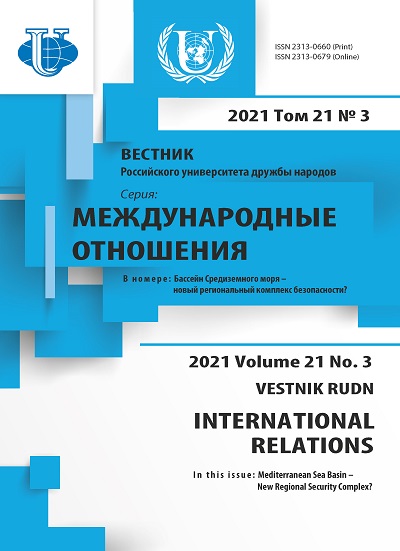The Role of non-Western Countries in the Construction of Russian Great Powerness: The Cases of Turkey and Israel
- 作者: Birinci E.1, Sucu A.E.2, Safranchuk I.A.2
-
隶属关系:
- Lomonosov Moscow State University
- MGIMO University
- 期: 卷 21, 编号 3 (2021): Mediterranean Sea Basin – New Regional Security Complex?
- 页面: 517-528
- 栏目: THEMATIC DOSSIER
- URL: https://journals.rudn.ru/international-relations/article/view/27447
- DOI: https://doi.org/10.22363/2313-0660-2021-21-3-517-528
如何引用文章
全文:
详细
This article contributes to the study of Russian great powerness, focusing on the potential of the Russian-Turkish and Russian-Israeli relations to influence the construction of Russia’s great power status in a multipolar world. Based upon Russian and English literature dedicated to the study of great power concept and Russian great powerness, authors adopt analytic eclecticism for the theoretical framework of the study. In this regard, for a comprehensive understanding of Russian great powerness, both constructivism with its focus on identity, and neorealism stressing national interests, security, and power, are applied. The authors actively employ the official documents, international agreements, statements of government officials, and official declarations. As a result, the study examines to what extent bilateral relations with Turkey and Israel, the West’s traditional non-Western allies, can contribute to the construction of Russian great power identity. For this purpose, first of all, the factors of Russian great power construction and its role in Russian foreign policy are examined. After addressing the efficiency of great power status as a foreign policy tool, the development of Russian-Turkish and Russian-Israeli relations are discussed. It is concluded that Russia has developed strategically significant relations with Turkey and Israel despite the deteriorated relations with the West, and the development of these relations has supported the consolidation of Russia’s great power status at the international and regional levels. Furthermore, the study suggests that Russian-Turkish and Russian-Israeli bilateral relations can enable Russia to strengthen its great power status vis-à-vis the West via cooperation and competition and contribute to the construction of a multipolar world.
作者简介
Ebru Birinci
Lomonosov Moscow State University
编辑信件的主要联系方式.
Email: ebrubirinci@windowslive.com
ORCID iD: 0000-0002-6919-4275
PhD Student, Department of Comparative Politics
Moscow, Russian FederationAli Sucu
MGIMO University
Email: a.sudju@inno.mgimo.ru
ORCID iD: 0000-0003-0789-2198
PhD Student, Department of Global Political Process
Moscow, Russian FederationIvan Safranchuk
MGIMO University
Email: i.safranchuk@inno.mgimo.ru
ORCID iD: 0000-0003-2214-6628
PhD in Political Sciences, Director, Center of Euro-Asian Research, Institute for International Studies
Moscow, Russian Federation参考
- Buzan, B., & Waever, O. (2004). Regions and powers: The structure of international security. Cambridge: Cambridge University Press.
- Denisov, I., & Safranchuk, I. (2016) Four problems of the SCO in connection with its enlargement. Russian Politics and Law, 54(5-6), 494-515. https://doi.org/10.1080/10611940.2016.1296304
- Denisov, I., Kazantsev, A., Lukyanov, F., & Safranchuk, I. (2019). Shifting strategic focus of BRICS and great power competition. Strategic Analysis, 43(6), 487-498. https://doi.org/10.1080/09700161.2019.1669888
- Erşen, E. (2017). Evaluating the fighter jet crisis in Turkish-Russian relations. Insight Turkey, 19(4), 85-103. https://doi.org/10.25253/99.2017194.06
- Freedman, R. O. (1998). Russia and Israel under Yeltsin. Israel Studies, 3(1), 140-169.
- Freedman, R. O. (2010). Russia, Israel and the Arab-Israeli conflict: The Putin years. Middle East Policy, 17(3), 51-63. https://doi.org/10.1111/j.1475-4967.2010.00450.x
- Freedman, R. O. (2014). Israel and Russia: Jerusalem and its relations with Moscow under Putin. In C. Shindler (Ed.), Israel and the world powers diplomatic alliances and international relations beyond the Middle East (pp. 125-154). London and New York: I.B. Tauris
- Hopf, T. (2002). Social construction of foreign policy: Identities and foreign policies. Moscow, 1955 and 1999. Ithaca and London: Cornell University Press.
- Katz, M. N., & Casula, P. (2018). The Middle East. In A. P. Tsygankov (Ed.), Routledge handbook of Russian foreign policy (pp. 295-310). London and New York: Routledge.
- Katz, Y., & Bohbot, A. (2017). The Weapon wizards: How Israel became a high-tech military superpower. New York: St. Martin’s Press.
- Kuchins, A. C., & Zevelev, I. A. (2012). Russian foreign policy: Continuity in change. The Washington Quarterly, 35(1), 147-161. https://doi.org/10.1080/0163660X.2012.642787
- Lasensky, S. B., & Michlin-Shapir, V. (2019). Avoiding zero-sum: Israel and Russia in an evolving Middle East. In K. Mezran & A. Varvelli (Eds.), The MENA Region: A great power competition (pp. 141-157). Milano: ISPI and Atlantic Council
- Lukin, A. (2018). A Russian perspective on the Sino-Russian rapprochement. Asia Policy, 13(1), 19-25. https://doi.org/10.1353/asp.2018.0004
- Masumova, N. (2018). Russia and Turkey: Resetting economic partnership. PERCEPTIONS: Journal of International Affairs, 23(2), 33-50.
- Mearsheimer, J. J. (2001). The tragedy of great power politics. New York: W. W. Norton & Company.
- Moshkova, T. (2018). Russian-Israeli relations: The role of the Russian-speaking community of the state of Israel. Vestnik RUDN. International Relations, 18(2), 387-399. https://doi.org/10.22363/2313-0660-2018-18-2-387-399
- Neumann, I. (2003). Russia and the idea of Europe: A study in identity and international relations. New York and London: Routledge.
- Oulin, S. (2013). Bilateral Economic Relations. In Z. Magen & V. Naumkin (Eds.), Russia and Israel in the changing Middle East (pp. 81-86). Tel Aviv: Institute for National Security Studies.
- Pinfold, R. G., & Peters, J. (2021). The limits of Israel’s periphery doctrine: Lessons from the Caucasus and Central Asia. Mediterranean Politics, 26(1), 25-49. https://doi.org/10.1080/13629395.2019.1693125
- Safranchuk, I. A. (2018). Russian-U.S. relations: Torn between the practical and ideational agendas. Russia in Global Affairs, 16(4), 96-119. https://doi.org/10.31278/1810-6374-2018-16-4-96-119
- Safranchuk, I. A. (2020). M - Messianism. Russian in Global Affairs, 18(1), 105-107. https://doi.org/10.31278/1810-6374-2020-18-1-105-107
- Shakleina, T. A. (2011). Great powers and regional subsystems. Mezhdunarodnye Processy, 9(2), 29-39. (In Russian).
- Tsygankov, A. P. (2016). Russia’s foreign policy: Change and continuity in national identity. New York: Rowman & Littlefield
- Tsygankov, A. P. (2020). G - Great powerness. Russia in Global Affairs, 18(1), 85-91. https://doi.org/10.31278/1810-6374-2020-18-1-85-91
- Ulçenko, N. (2016). Sovyet Sonrası Dönemde Türkiye-Rusya Ticari ve İktisadi İlişkileri. Marmara Türkiyat Araştırmaları Dergisi, 3(2), 121-138
- Zvyagelskaya, I. D. (2014). Middle East clinch: Conflicts in the Middle East and Russian politics. Moscow: Aspekt Press publ. (In Russian).








